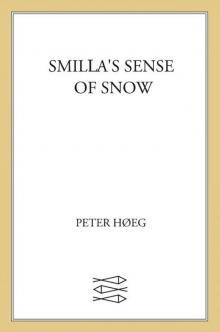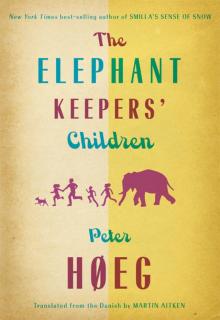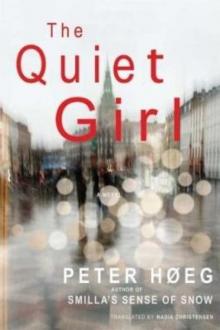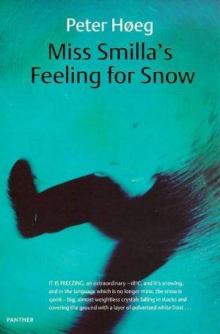- Home
- Peter Høeg
The Susan Effect Page 2
The Susan Effect Read online
Page 2
Our house breathes, though only just. We’ve been away for six months. That fact in itself lends a sense of abandonment to the place. And then there is what we have brought back to it. An atmosphere no building material on earth could withstand in the long run.
Some people believe a felicitous family life comes of successful compromises. This is not true. Love is without compromise. Happy families come from solving koans. Or rather: dissolving them.
I’d thought we’d solved ours for good.
I should have known better. Nothing in the world is for good. The laws of nature are temporary. No sooner has physics contented itself with one picture of the world than the picture dissolves and turns out to be an exception in some greater paradigm. One of the first things Andrea Fink told me was that she had heard John Bell say at a seminar at Amherst College that in its very foundation quantum physics holds the seed of its own demise.
Thus, the Svendsen family’s good years have now revealed themselves to be but a temporary state of harmony in a much wider chaos.
At least we tried. And one of the puzzles we solved was the issue of how four extreme individualists, all of them solitary creatures by nature, may live together in the same house.
Like, for instance, the kitchen and the lounge, which are one big room. Without a single argument we agreed on the furniture, the piano and the white walls. And we concurred that the only picture that should hang on those walls was a photograph of Andrea Fink.
‘I’m glad to see you.’
Thit breaks the silence.
Some would consider this to be an encouraging start. But not us. Ever since kindergarten her friends have approached her with caution. Introductory sweetness is often followed by something more caustic. Like now.
‘I was collected by a woman from the police. Her name was Irene. She took me all the way on the plane. She said Harald’s looking at eighty years, Mum at twenty-five, because the man’s a famous Bollywood actor. I think we need to look around us. Not think of the family we used to be. More the family we’ve become. Without really having noticed. Mum’s interested in young men.’
‘He was twenty-five,’ I say.
‘You could have been his mother.’
I make no comment. In purely biological terms, she’s right. ‘Dad’s interested in young girls. Harald wants money. And I …’
We hold our breath.
‘I want a house by the sea. Six horses to ride. And people to do the cleaning for me.’
We breathe out again. Respectfully. Not many girls of sixteen have the courage to peer so deeply inside their souls.
I lift the dough from the mixing bowl. My Mettler weighing scales have measured the flour to within one hundred thousandth of a gram. Few housewives would be able to outshine me there. Water and mechanical manipulation have created elastic peptide chains.
The worktop is Corian, made from stone that has been crushed and then glued together again. The textural quality is once again a koan solved, an impossible task, a physical paradox: the unification of marble, plastic and porcelain.
I’ve had the edge rounded. I let the dough hang down over it and stretch itself wafer-thin. We experimental physicists do not merely picture our formulas, we feel them with our fingers.
‘What game were you playing, Mum?’
I don’t answer.
They all look at the wall behind me, at the photo of Andrea Fink.
3
OVER TWO DECADES have passed since I stood face to face with Andrea Fink for the first time.
It was in the main auditorium of the H.C. Ørsted Institute of the University of Copenhagen. Her visits to Denmark were seldom, her lectures more seldom still. The auditorium seats eight hundred. Two thousand had turned up. People were standing in the corridor.
She spoke on Riemann’s geometry. When she finished she disappeared in a split second, as though she had dissolved on the spot. Later I found out it was to avoid the hordes wanting to give her a letter, shake her hand, kiss a corner of her cape. Or tear off a button for that special souvenir.
No one could leave the room even though she was gone. They weren’t going home.
After three-quarters of an hour the place had reluctantly emptied. Everyone was gone except me, I was the last one there. And then she appeared in front of the blackboard.
The auditorium’s acoustics are such that two individuals placed at any random distance from each other will at any time be able to conduct a whispered conversation. When Andrea Fink spoke, she did so softly, and yet I had no trouble picking up her voice on the back row.
‘You wrote to me. I’ve read your letter. And your thesis. Interesting. But I’m afraid I don’t accept mentees.’
She stepped up the stairs towards me.
‘I especially noted the bit where you say that what makes you most happy is the knowledge that natural laws exist. Quite a statement for such a young woman. At that point I asked myself: Is a girl who would say such a thing not simply neurotic? Is she?’
She came closer. She spoke as if she meant someone else.
‘You’re in touch with the body. That’s something I look for. The deep insights never come from the brain alone. You’ve a flair for mathematics and physics. You’ve got looks. So what’s the problem?’
‘Men.’
My letter hadn’t mentioned anything about problems.
‘What about them?’
‘They’re scrumptious. Like apples. It’s hard for me to stop myself. Afterwards it’s a mess.’
She sat down on the seat in front of me.
‘What is it you want?’
‘I want to get into physics. The university is a prep school, a waiting room. I don’t want to sit in a waiting room, I want to go inside, where you are. I must. I’ve known all along, ever since I started reading the first articles. When I was twelve someone showed me the periodic table and I understood it immediately. It was the happiest moment of my life. I understood the existence of natural laws. The way they balance out the chaos. But I don’t want to understand physics from the outside. You can open the door.’
She put a hand on my arm. It was the first time I experienced the touch I, with time, would come to realise was indispensable to her. It was not merely a gesture of kindness, it was explorative. Her fingers were trying to orient themselves in my system.
‘You say you’re preoccupied with group field theory. And that you have personal experiences. What do you mean?’
‘I evoke sincerity.’
‘In what way?’
‘When I’m waiting for the bus, it only takes a few minutes and the man in front of me in the queue starts telling me about his wife’s illness. Once I’m inside, the woman on the seat next to me tells me how much she loves her dog. The boys getting off at the same stop as me tell me how worried they are that they won’t make the first team, and then all about the girls they’re secretly in love with.’
She unbuttoned my sleeve, rolled it up and turned my arm over. Her fingers explored the scars.
‘I always wanted a daughter,’ she said.
As soon as the words left her, she stiffened. The sentence was completely out of place. As was my reply:
‘I always wanted a mother.’
People who experience it for the first time are usually taken aback. But not Andrea Fink. Her astonishment was mild. Beneath it lay an intense curiosity.
‘I didn’t intend to say that,’ she said. ‘Nor to roll up your sleeve. It was something inside me. Something strange.’
We looked at each other. When she spoke, her words came out slowly. Inside, she was scanning her own system.
‘It feels like losing one’s footing. As though we are no longer supported by the conventions that govern ordinary conversations. Do you have a word for it?’
‘Where I grew up they called it the Susan Effect.’
She rolled down my sleeve and buttoned the cuff.
‘It’s not normal research. Nothing will be published. All results will be
confidential. Funding will come from a separate grant. It would be an odd direction for your career.’
‘I’ve got scars,’ I said. ‘I’ll be a difficult pupil.’
She leaned her head back and laughed. Her laughter was a joy to her surroundings, even to the empty auditorium.
She stood up.
‘Come and see me next week. I’ve got three sons. You’re to leave them alone.’
We looked each other in the eye. Deep sincerity is always accompanied by a feeling of the future emerging. Perhaps she and I both sensed that within six months I would have been to bed with all three sons. And a year later with her husband.
Perhaps we both knew that, given the forces that were now activated between us, I would suppress anything that might stand in the way of getting closer to her.
‘Consider it carefully, Susan. And whatever you do, don’t burn your bridges.’
I said nothing. Speech was unnecessary. There was no return. Not because the bridges behind me were burned, but because they had lost their relevance.
4
THERE ARE WOMEN who know five years before they get pregnant that they’re going to have two girls and a boy, and that these offspring will attend the International School and grow up multilingual and be voted Face of the Year in 2027 and study law and marry members of the Council of Ethics.
The only thing I knew was that I would have children and that I would end up cooking for them.
Which I’ve just done.
We eat in silence. It may be our last meal together. Even so, I assume it’s okay to enjoy it.
I never enforced mealtimes. When the twins were little and thought of meals only as fuel replenishment, preferably to take place in mid-air so as not to be compelled to put feet to the ground and interrupt their games, I tended to wait and let them get on with it, to come to the table when it suited them. I think they were nine before we had the kind of immersion we’ve got now.
Together we savour the light tang of the salad. The sharp bite of the dressing. The pizza base, so thin it’s no longer bread, just an intense taste of grain from the Italian flour, an ethereal crispness beneath the stable-like aroma of melted cheese, the tartness and sweetness of scalding-hot tomatoes and the corpulent bitterness of olives.
I will never admit it to any living person, but every time I serve the family food I feel a slight contraction of my womb. The same as when I breastfed the twins. In a way it’s as if I’m still doing it. And it’s not just the children, it’s also the solar eclipse that is Laban Svendsen.
It’s a prehistoric sensation, with a hint of something Precambrian. It has evolution and millions of years behind it, every single instance of a mammal giving milk to feed its young.
Soon we’ll be a family no more. But right now we’re together, and no matter how bad the situation may seem, we need nutrition.
Laban wipes his hands on his napkin. We have always used our fingers to eat pizza. Taste is not just a process localised to the palate, it’s in the hands too. He opens the grey cardboard folder and lays it out in the middle of the table.
Uppermost is a black-and-white photograph. Of a woman, perhaps in her early sixties. Her hair is thick and wavy, a light shade of grey, her dazzling features striking in the Scandinavian way, a Nordic goddess straight out of Valhalla.
If it hadn’t been for the clothes. And the jewellery. Around her bare neck hangs a string of large pearls that even on the photograph shimmer with the kind of resplendence produced only within the largest oysters at depths the word imitation cannot penetrate. Her dark woollen jumper hangs silk-like from her frame as only cashmere can.
Underneath the photo is an envelope. Laban hands it to me. I fetch a knife and slit it open. It contains one folded sheet of A4. I read the words out loud:
Magrethe Spliid. Born 1942. MA in History, employed at the Royal Danish Defence College, Department of Military History, since 1964. Consultant for NASA from 1970. US resident 1968–71. Affiliated to Yale and Cornell; US Military Academy; US Air Force Institute of Conflict Research, Michigan. Professor at the Royal Danish Defence College, Second Section, Department of Strategic and Operational Forecasting, from 1971. Permanently affiliated consultant following retirement in 2014.
Underneath, in block letters, a hand has written two telegraphic sentences:
Danish Parliamentary Future Commission – minutes of two final meetings?
List of Commission members?
That’s all.
I open my computer and type Magrethe Spliid’s name into the browser’s search field. All it yields is a long list of her published articles. And three small newspaper notices on the occasions of her fiftieth, sixtieth and seventieth birthdays. She is now seventy-six, but looks at least fifteen years younger.
Thit and Harald come and stand next to me. Laban remains seated. To him, a computer is a waste product. He doesn’t care to touch them, won’t even look at one. Most of all, his sophisticated ear cannot listen to a thing they utter.
Danish Parliamentary Future Commission produces zero hits.
I pick up our landline from the table. It’s probably one of the last remaining in the country. There’s a phone number on the Defence College website. I dial the number and switch on the speaker.
‘Royal Danish Defence College.’
The voice at the other end belongs not to some junior office girl, more like a warrant officer of the women’s reserve.
‘I’d like to speak to Magrethe Spliid.’
‘I’m afraid that’s not possible. Can I take a message?’
‘My name is Susan Svendsen. I’m a professor at the Department of Experimental Physics, Copenhagen University. Can you give me her direct number?’
‘I’m afraid I’m not at liberty to divulge it.’
‘Is there anything you can divulge?’
‘I can give you the college email address.’
‘That would leave me eternally indebted.’
One of the great advantages of landlines, and the real reason I’ve kept ours, is that you can slam down the receiver. Which is what I do.
Laban shakes the envelope. And listens. He has always listened his way through life.
It rattles.
Onto the table he tips out a small photograph. It’s a snapshot, in colour, though it must be around fifty years old, from the dawn of the technology. It looks tinted, bleached by the march of time.
But the scene it depicts isn’t at all faded. Two women are seated on the terrace of the Café a Porta on Kongens Nytorv, the sun is shining, they are sharing a bottle of pink champagne and have such an air about them that even though the camera has failed to capture the queue of admirers, one instinctively knows it to be there, just outside the frame, and that it reaches all the way along Lille Kongensgade.
The first of these women is Magrethe Spliid. The way she looked in her early twenties. Rather less grave, and without the authority. But her beauty is the same.
To begin with, I don’t think I know the second woman. Yet something about her face makes me uneasy.
I glance up at my family. They look surprised. Surprised that the woman is who she is. And that I have failed to recognise her.
‘It’s Grandmother,’ says Harald. ‘All sails to the wind, and afterburner ignited.’
I gather the plates.
‘That girl,’ says Laban. ‘Laksmir, the one I went away with. She was actually a student of mine. At the conservatory.’
Thit delivers him a smile, the kind that goes straight through tissue and bone and embeds itself in the wall behind its recipient.
‘So what you’re saying, Dad, is that your relationship was in actual fact mostly of a musical nature?’
Laban says nothing. He’s run out of road. An unfamiliar position for a man whose self-image involves the world lying at his feet.
‘Mum, why hasn’t Hegn given us more information?’
The question is Harald’s. He likes exactness. Economy with information offends him.
‘He’s testing us,’ I answer. ‘Testing me. He doesn’t believe in the Effect.’
5
THE FIRST TIME I laid eyes on Laban’s face it was partly concealed behind twelve kilos of freshly excavated potatoes that Andrea Fink had commandeered him into peeling.
I was nineteen and had known Andrea Fink for a couple of years, and at that point in time her home was as yet open and convivial. But the dinner parties she held in her honorary residence were not the kind at which one handed one’s fur to a servant before sitting down at a resplendent table, unfolding the starched cloth napkin into one’s lap and digging in.
Andrea Fink invited people for four thirty, thrust them a pinny in the hallway and led them downstairs into the scullery, in the middle of which was a wheelbarrow full of muddy leeks, and on the table a quarter part of a calf awash in its own blood. Besides the twelve kilos of potatoes Laban Svendsen was busy peeling.
The language has no adequate terms for what occurred inside me when I saw him. In a way I suppose I recognised him. Without ever having seen him.
Sometimes recognition has nothing to do with having seen each other before. Sometimes, as then, it is a sombre feeling of falling victim to an inexplicable and already existing intimacy, the origins of which cannot be pinpointed.
I turned to make myself scarce, but Andrea Fink was standing behind me. She pressed a potato peeler into my hand, and edged me around the table and deposited me opposite Laban. I was stuck.
The potatoes were small, thick-skinned and scabby, with lots of little black eyes that stared at me as if in trepidation at the fact that they were soon to be gouged out. Our hands were reddened and numbed by the cold water. We stood there facing each other, toiling without a word.
And then a young girl came up to us, sixteen years old perhaps, one of the serving staff, in uniform. One should not mistake Andrea Fink’s motives. The fact of her guests being made to prepare dinner was not a matter of thrift, for Andrea was nothing if not well staffed, both in her laboratories and at home on the domestic front.

 The Woman and the Ape
The Woman and the Ape Smilla's Sense of Snow
Smilla's Sense of Snow Borderliners
Borderliners The Susan Effect
The Susan Effect The History of Danish Dreams
The History of Danish Dreams The Elephant Keepers' Children
The Elephant Keepers' Children The Quiet Girl - Peter Hoeg
The Quiet Girl - Peter Hoeg Smilla's Sense of Snow aka Miss Smilla's Feeling for Snow
Smilla's Sense of Snow aka Miss Smilla's Feeling for Snow